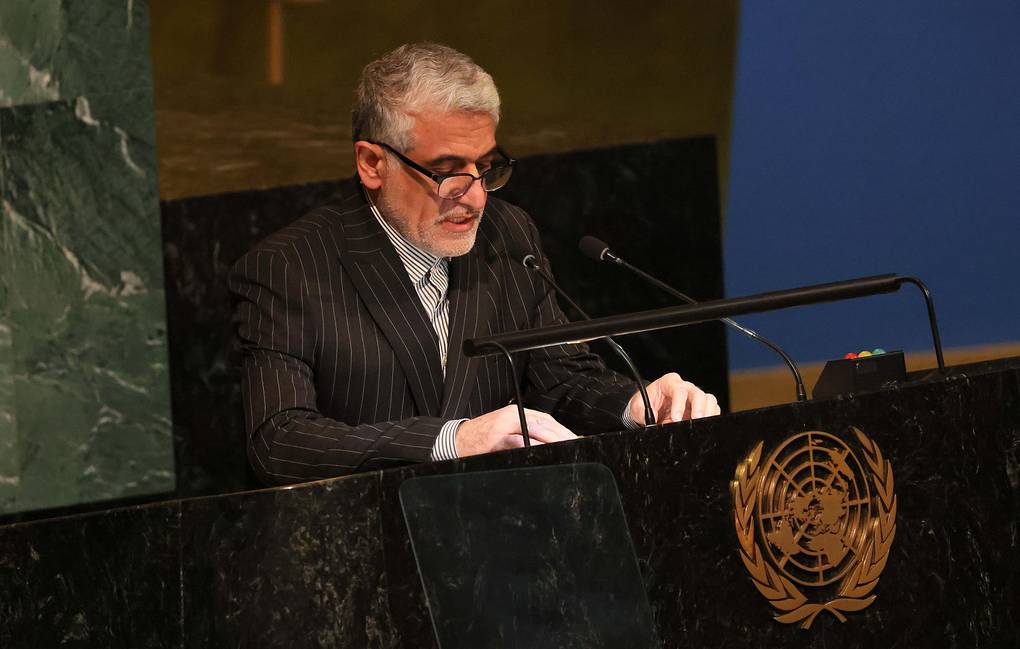Other examples of the US’s unilateral actions include its re-imposition of sanctions against the Islamic Republic of Iran as well as its coercion of other countries to engage in the anti-Iran measures, the envoy said as he addressed a UN Security Council meeting on Monday that discussed multiallelism, international peace and security.
The following is the full text of the Iranian representative’s speech at the meeting held in New York City:
Mr. President,
We acknowledge Russia’s Presidency for convening this important and timely open debate, and we thank the Secretary-General for his insightful views and for reaffirming the significance of multilateralism.
Mr. President,
Multilateralism has been recognized as a well-established approach to addressing global challenges and effective multilateralism, operating within the framework of the UN Charter, is essential for ensuring international peace and security.
Achieving this requires a strong commitment to upholding international law, promoting transparency and accountability, and adhering to the principles outlined in the UN Charter.
The UN Charter establishes a comprehensive framework of principles and norms that member states must adhere to in their relations with one another. These principles include peaceful dispute resolution, respect for sovereignty and territorial integrity, non-interference in internal affairs, the prohibition of the use of force, and the promotion of human rights and fundamental freedoms. By abiding by these principles, member states can promote a stable and secure international legal order that benefits all nations and peoples.
In the meantime, multilateralism must ensure the active participation of all nations, regardless of their size, wealth, or political orientation.
The exclusion of any country undermines the principle of inclusiveness and may result in biased outcomes.
All countries, especially those directly affected by decisions made through multilateral mechanisms, should have an equal opportunity to participate, contribute, and be heard in the decision-making processes.
Mr. President,
The integrity and effectiveness of multilateralism are undermined by the abuse of the UN system and selective application of international law, as well as the use of unilateralism, which poses a serious threat to international cooperation, peace, and security.
Unilateral coercive measures (UCMs), including their extraterritorial application, represent a concerning example of harmful unilateral acts that run counter to the fundamental principles of international law, the UN Charter, and basic human rights.
These illegal measures have far-reaching humanitarian consequences and can undermine diplomatic efforts aimed at resolving disputes and promoting cooperation.
Within this context, the United States’ unilateral withdrawal from the JCPOA, re-imposition of illegal unilateral sanctions on Iran, its coercion of other countries to engage in these illegal actions, and defiance of the International Court of Justice’s order are striking examples of how such harmful unilateral acts violate the UN Charter, undermine the UN system and threaten the multilateralism.
In its recent judgment on 30 March 2023 in the case concerning Certain Iranian Assets, the International Court of Justice (ICJ) has declared that the United States has violated its international obligations to the Iranian people by imposing unilateral sanctions that are deemed illegal under international law. The ICJ’s ruling is final and binding, requiring the US to comply with this decision.
In conclusion, Mr. President, collaboration should be the cornerstone of multilateralism, rather than confrontation. Collaborative approaches foster trust, build consensus, and promote sustainable solutions to global challenges. Through collaborative problem-solving and engagement with all parties, multilateralism can effectively address the challenges facing our world today.
In this context, diplomacy, dialogue, and negotiation should be the preferred means for resolving disputes among member states.
I thank you, Mr. President.
